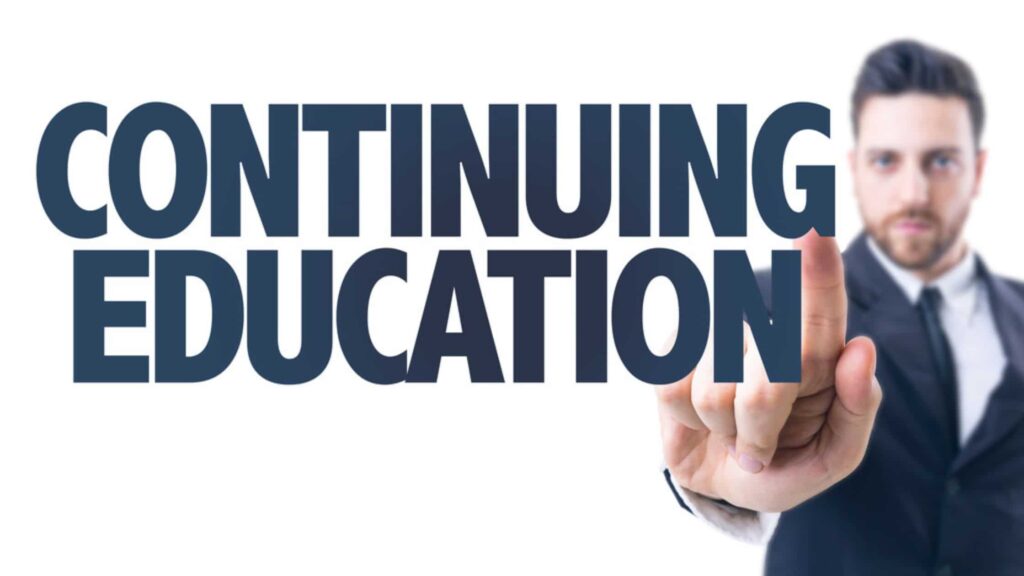In a rapidly evolving world, the pursuit of knowledge doesn’t end with formal education. Continuing education and continuous learning have emerged as essential pillars for personal and professional growth. This comprehensive article delves into the intricacies of continuing education, drawing distinctions between professional development, exploring various types, and highlighting the versatile applications of ongoing learning endeavors.
1. Understanding Continuing Education
Defining Continuing Education
Continuing education refers to the ongoing learning process beyond the traditional confines of formal education. It is a deliberate and systematic effort to acquire new knowledge, skills, and competencies throughout one’s life. Unlike formal education, which typically concludes with a degree, continuing education is a dynamic and lifelong pursuit.
Differentiating Continuing Education and Professional Development
- Continuing Education: Encompassing a broad spectrum of learning activities, continuing education is a comprehensive term that includes any form of education undertaken after the completion of formal schooling. It is not confined to professional contexts and can span academic, recreational, or personal development pursuits.
- Professional Development: While a subset of continuing education, professional development specifically focuses on enhancing skills and knowledge relevant to one’s profession. It is a strategic and targeted approach to advancing in a specific career, often involving training, workshops, and certifications.
Meet Vati, your dedicated companion on the journey of continuous learning and personal growth. Tailoring insights and resources to your unique needs, Vati is here to guide you through the realm of continuing education. Elevate your skills, explore new horizons, and embrace lifelong learning with Vati by your side.
2. Types of Continuing Education

Formal Academic Courses
- Degree Programs: Pursuing additional degrees, such as master’s or doctoral programs, allows individuals to deepen their expertise in a specific field.
- Certificate Programs: Short-term, focused certificate programs provide specialized knowledge and skills without the time commitment of a full degree.
Professional Training and Workshops
- Industry-Specific Training: Organizations and professional associations often offer training programs to keep employees abreast of industry trends and advancements.
- Skill-Specific Workshops: Workshops focusing on specific skills, such as leadership, communication, or project management, contribute to professional development.
Online Learning and MOOCs
- Massive Open Online Courses (MOOCs): Online platforms offer MOOCs, providing access to courses from universities and institutions worldwide, making education accessible and flexible.
- Webinars and Virtual Seminars: Web-based seminars and workshops facilitate remote learning, enabling individuals to participate from anywhere.
Conferences and Seminars
- Professional Conferences: Attending conferences offers opportunities for networking, staying updated on industry trends, and gaining insights from experts.
- Seminar Series: Specialized seminar series delve deep into specific topics, providing in-depth knowledge in a structured format.
Self-Directed Learning
- Reading and Research: Books, articles, and research papers allow individuals to explore topics at their own pace and depth.
- Podcasts and Audiobooks: Audio-based learning provides a convenient way to absorb information while on the go.
3. What is Continuing Education Used For?

Career Advancement
- Skill Enhancement: Continuing education enables individuals to acquire new skills or deepen existing ones, enhancing their competitiveness in the job market.
- Professional Certifications: Earning certifications demonstrates expertise in a particular area, increasing credibility and opening doors for career advancement.
Stay Updated in Dynamic Industries
- Technological Advancements: Industries experiencing rapid technological changes, such as IT or healthcare, require continuous learning to stay relevant.
- Regulatory Compliance: In sectors like finance or healthcare, staying informed about changing regulations is crucial for compliance and ethical practice.
Personal Enrichment and Fulfillment
- Hobbies and Interests: Pursuing courses or workshops related to personal interests contributes to overall life satisfaction and fulfillment.
- Cultural and Language Studies: Learning about different cultures or mastering a new language broadens horizons and enriches personal experiences.
Adapting to Career Transitions
- Career Changes: Continuing education facilitates smooth career transitions by providing the necessary skills and knowledge for a new field.
- Entrepreneurship: Individuals venturing into entrepreneurship benefit from continuous learning to navigate the complexities of running a business.
4. Challenges and Benefits of Continuing Education

Challenges
- Time Constraints: Balancing work, personal life, and continuous learning can be challenging, requiring effective time management.
- Financial Considerations: The cost of continuing education, especially for formal academic programs, can be a barrier for some individuals.
Benefits
- Career Adaptability: Continuous learning enhances adaptability, making individuals more resilient to changes in their professions or industries.
- Personal Growth: Beyond professional benefits, continuing education contributes to personal growth, fostering a sense of curiosity and intellectual stimulation.
5. The Future of Continuous Learning
Technology Integration
- E-Learning Platforms: The proliferation of e-learning platforms will continue to democratize education, making it accessible to a global audience.
- Virtual Reality (VR) and Augmented Reality (AR): Innovations in VR and AR will transform the learning experience, providing immersive and interactive educational opportunities.
Lifelong Learning Culture
- Organizational Support: Companies that encourage and support continuous learning foster a culture of innovation and adaptability.
- Government Initiatives: Governments promoting lifelong learning through policies and incentives contribute to a society that values education throughout one’s life.
Conclusion
In conclusion, continuing education and continuous learning are indispensable components of a dynamic and evolving world. Whether pursued for career advancement, personal enrichment, or adapting to changing industries, continuous learning opens doors to new opportunities and perspectives. As technology and societal expectations evolve, embracing a lifelong learning mindset becomes not only beneficial but essential for navigating the complexities of the modern world. As we continue to shape the future, the pursuit of knowledge remains a guiding force for individual and collective progress.





